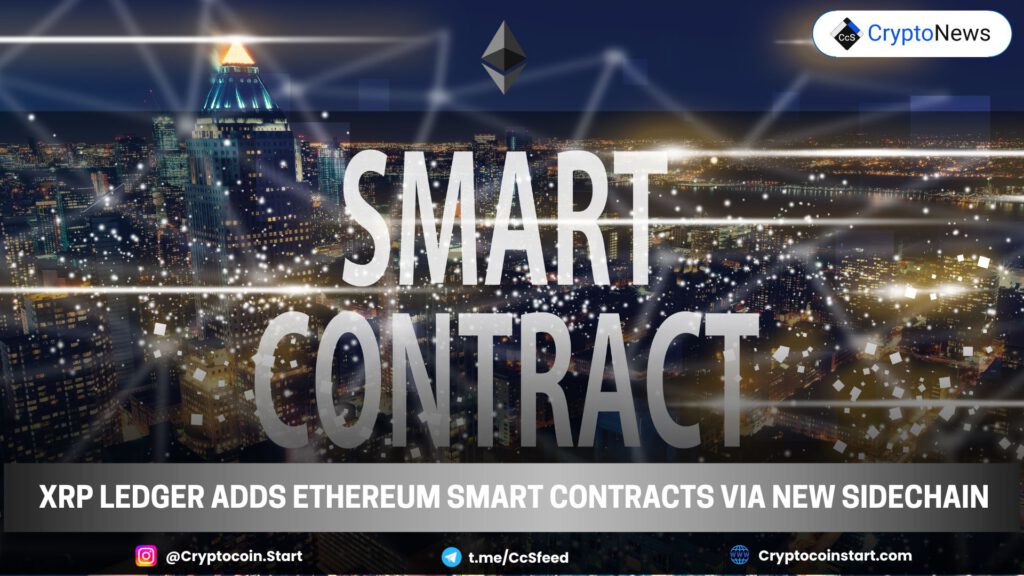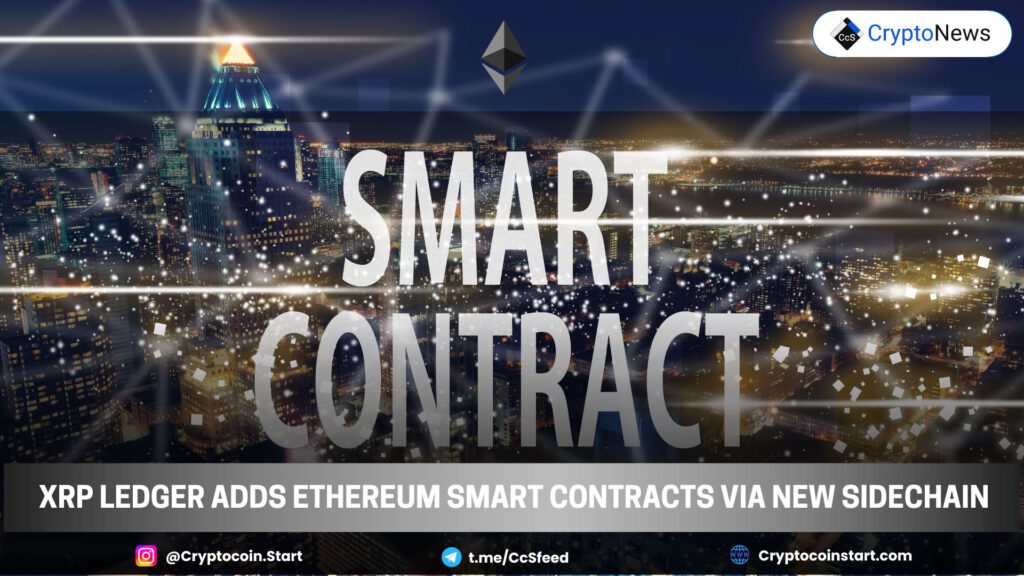
Ripple Integrates Ethereum-Compatible Smart Contracts into XRP Ledger with New Sidechain
Ripple is making a major advancement by integrating Ethereum-compatible smart contracts into the XRP Ledger (XRPL) through a new sidechain. This development is set to significantly enhance the functionality and versatility of the XRP ecosystem.
Ripple’s Ambitious Leap: Integrating Ethereum-Compatible Smart Contracts
Ripple is expanding the capabilities of the XRP Ledger by incorporating Ethereum-compatible smart contracts via a newly developed sidechain. This strategic move aims to broaden XRPL’s use cases beyond simple transactions, enabling support for complex applications such as:
- Decentralized exchanges (DEXs)
- Token issuance
- Decentralized financial (DeFi) applications
With the addition of Ethereum-compatible smart contracts, XRPL is evolving into a more comprehensive blockchain platform. This integration will allow XRPL to support decentralized applications (dApps) and advance its position in the blockchain space, competing with leading platforms like Ethereum.
The cornerstone of this integration is the XRPL EVM sidechain, which brings Ethereum Virtual Machine (EVM) compatibility to XRPL. The EVM environment enables the execution of smart contracts on Ethereum, and by incorporating this into XRPL, Ripple is facilitating the deployment of Ethereum-based smart contracts on the XRP Ledger. This cross-chain functionality is expected to attract Ethereum developers to XRPL, offering them a familiar development environment.
The XRPL EVM sidechain will leverage the Axelar network, a bridging service for seamless cross-chain token transfers. Users will be able to move tokens between the XRPL EVM sidechain and 55 other blockchains. Wrapped XRP (eXRP) will serve as the native asset and gas token on this sidechain, supporting transactions and smart contract operations.
Wrapped XRP (eXRP) and Its Role in the New Sidechain
Wrapped XRP (eXRP) is a crucial component of the XRPL EVM sidechain. As the native asset on this sidechain, eXRP will be used for paying transaction fees and executing smart contracts. eXRP represents XRP in a format compatible with other blockchains, ensuring the XRP token remains central to the expanding ecosystem.
A Unified Blockchain Ecosystem
Ripple’s initiative to integrate Ethereum-compatible smart contracts via the XRPL EVM sidechain aligns with its vision to unify the blockchain ecosystem. This development is expected to:
- Create new opportunities for collaboration and innovation
- Attract Ethereum developers to XRPL
- Increase demand for XRP, potentially boosting its value
This move is part of Ripple’s broader strategy to enhance blockchain interoperability and position XRPL as a versatile platform for a wide range of applications.
21.co Expands Wrapped Token Offerings with Launch of 21BTC on Ethereum
21.co, the parent company of 21Shares, has launched 21BTC, a Bitcoin wrapper on the Ethereum blockchain. This new development marks a significant expansion of 21.co’s suite of wrapped tokens, which already includes versions of Avalanche (AVAX), Polkadot (DOT), and Solana (SOL) on Ethereum.
Strategic Expansion of 21BTC
The introduction of 21BTC on Ethereum follows its earlier launch on the Solana network. This strategic expansion aims to leverage Ethereum’s large user base and its robust decentralized finance (DeFi) ecosystem. Ethereum’s platform provides various financial activities, including:
- Lending and borrowing
- Trading
- Yield farming
Eliézer Ndinga, 21.co’s head of strategy and business development, highlighted the company’s commitment to rigorous asset management practices. This includes the use of institutional-grade custodians and advanced security measures to protect users’ investments.
Security and Liquidity of 21BTC
21BTC emphasizes strong security protocols. The Bitcoin backing 21BTC is stored in cold storage, ensuring protection from theft and hacking. Additionally, 21.co has partnered with Flow Trader for market-making support, ensuring liquidity and market stability for 21BTC.
In contrast to the controversies surrounding Wrapped Bitcoin (wBTC) and its custodian, BitGo, 21BTC is marketed as a more secure and reliable alternative. This focus on security positions 21BTC as a promising option in the wrapped Bitcoin market.
Enhancing Blockchain Interoperability
21.co’s launch of 21BTC on Ethereum is part of a broader strategy to improve liquidity and interoperability across blockchain networks. By offering wrapped versions of Bitcoin, Avalanche, Polkadot, and Solana, 21.co aims to create a more interconnected blockchain ecosystem where assets can flow freely between networks.
This interoperability is essential for the future of DeFi, allowing users to maximize their assets’ utility and engage in various financial activities across different networks.
21Shares: A Leader in Cryptocurrency ETFs
21.co’s subsidiary, 21Shares, is renowned for its cryptocurrency exchange-traded funds (ETFs), including the ARK 21Shares Bitcoin ETF (ARKB) and the 21Shares Core Ethereum ETF (CETH). The launch of 21BTC aligns with 21.co’s expertise in managing crypto assets and responds to the growing demand for secure, interoperable tokens in DeFi applications.
As the DeFi ecosystem expands, the demand for wrapped assets like 21BTC is expected to rise, offering 21.co new opportunities in the digital asset space. The company’s focus on security and institutional-grade practices positions it well to compete in the wrapped token market.


